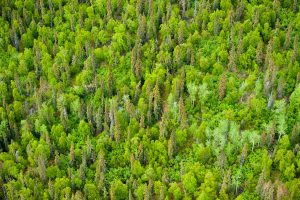“The zoonotic hypothesis is the only one backed by a solid scientific foundation, while the lab leak idea remains firmly in the realm of conspiracy.”
“Humanity’s destruction of biodiversity that creates the conditions for new viruses and diseases like COVID-19.”
“Forests reduce the spread of COVID-19.”
.
When the pandemic really started to get going back in March, scientists were already asking pointing to how things might have started:
Coronavirus pandemic linked to destruction of wildlife and world’s ecosystems
COVID-19 is the latest example of how human impact on biodiverse areas and wildlife habitats is linked to the spread of infectious diseases.
After the novel coronavirus broke out in Wuhan, China in late December 2019, it didn’t take long for conspiracy theorists to claim it was manufactured in a nearby lab.
Scientific consensus, on the other hand, is that the virus — SARS-CoV-2 — is a zoonotic disease that jumped from animal to human. It most likely originated in a bat, possibly before passing through another mammal.
While the virus was certainly not engineered in a laboratory, this doesn’t mean we haven’t played a role in the current pandemic. Human impingement on natural habitats, biodiversity loss and ecosystem degradation are making virus spillover events much more likely, a major new study from scientists in Australia and the US has found…
.
There are two key points here.
Firstly, just the last week, it has been confirmed that its was bats and not a lab that was the source of the virus:
How Can You Be So Sure That Covid-19 Didn’t Happen From A Lab Leak?
The natural explanation isn’t just overwhelmingly likely in this instance, but is likely to be the cause of most, if not all, future pandemics. Baseless accusations are being levied here, similar to ones that have had catastrophic consequences in the past. Worst of all, these evidence-free allegations are intensifying bigotry and violence against Asian-Americans. In science, we are interested in what is true, not what makes us feel better about the world. Until and unless that evidence arises, the zoonotic hypothesis is the only one backed by a solid scientific foundation, while the lab leak idea remains firmly in the realm of conspiracy.
Ask Ethan: How Can You Be So Sure That Covid-19 Didn’t Happen From A Lab Leak?
Wuhan Lab’s Last–And Only–Foreign Scientist Speaks Out on Covid Origins Debate – Bloomberg
The Covid Lab Leak Theory: Why a Natural Origin Story Is More Likely | The New Republic
.
Secondly, even back in March 2020, scientists were saying that ecological disruption was the most likely cause:
Destroyed Habitat Creates the Perfect Conditions for Coronavirus to Emerge
COVID-19 may be just the beginning of mass pandemics
Only a decade or two ago it was widely thought that tropical forests and intact natural environments teeming with exotic wildlife threatened humans by harboring the viruses and pathogens that lead to new diseases in humans like Ebola, HIV and dengue.
But a number of researchers today think that it is actually humanity’s destruction of biodiversity that creates the conditions for new viruses and diseases like COVID-19, the viral disease that emerged in China in December 2019, to arise—with profound health and economic impacts in rich and poor countries alike. In fact, a new discipline, planetary health, is emerging that focuses on the increasingly visible connections among the well-being of humans, other living things and entire ecosystems.
Destroyed Habitat Creates the Perfect Conditions for Coronavirus to Emerge – Scientific American
.
This has been confirmed with further research since:
As covered in these news pages:
Covid and ecology – Vision Group for Sidmouth
Covid, the environment and the spread of zoonotic diseases – Vision Group for Sidmouth
.
As well as science trumping conspiracy these last weeks, there has been further research into how looking after our environment can protect us:
 Forests can increase human immunity against pandemics like COVID-19
Forests can increase human immunity against pandemics like COVID-19
Our analysis shows that most of the COVID-affected areas in India are in states with lesser forest cover and vice versa
The immune system in living beings is boosted by internal and external factors. Many species play a noteworthy role in neutralising threats from other species irrespective of their origin and structure. Humans rely on numerous plants for immunity as plants’ components like nuts, fruits, leaves and rhizomes include natural immunity booster elements like antioxidants that enhance their immune system.
Besides holding various immunity booster elements, many plants produce particular chemical compounds to fight various diseases. They discharge some of these chemicals into the environment to defend themselves against rotting and insect attack. These air-borne chemical compounds referred to as phytoncides are equally beneficial to humans. Phytoncides manage or destroy numerous micro-organisms and viruses in air, cleanse the air and improve our self-cleansing ability…
Forests, as the biggest storehouse of plants, are great sources of phytoncides and therefore are hugely important for human immunity…
…findings show that forests reduce the spread of COVID-19. If we take regular ‘forest baths’ (taking in the forest atmosphere), plant extra forests and reduce the deforestation rate, we can fortify ourselves against pandemic illnesses like COVID-19.
As human immunity is directly related with many diseases, therefore forests need to be used for pandemic management and a forest area ought to be identified as a location of human protection or ‘Immunity Area’. Our primary investigation acknowledged forest zones as immunity booster areas and it needs to be investigated further.
Forests can increase human immunity against pandemics like COVID-19
.
Meanwhile, the World Commission on Protected Species has proposed a series of a actions:
Conserving Nature in a time of crisis: Protected Areas and COVID-19 | IUCN
And there are in fact all sorts of initiatives out there:
Preventing pandemics through biodiversity conservation and smart wildlife trade regulation
Empowering Whistleblowing to Counter Environmental Crimes and Prevent Pandemics
When Confronting a Pandemic, We Must Save Nature to Save Ourselves – Center for American Progress